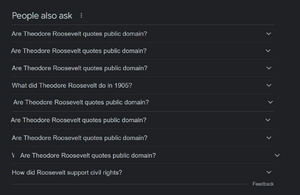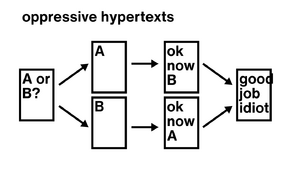User:Ssstephen/Reading: Difference between revisions
m (Ssstephen moved page User:Ssstephen/Stephen what is that book in your hand to User:Ssstephen/Reading) |
|
(No difference)
| |
Revision as of 21:00, 3 October 2022
oh this one?
Scripts, Grooves and Writing Machines, Lisa Gitelman
Print culture and non print media evolve in mutual inextricability. The phonograph and contemporary inscriptive forms were deeply dependent upon reworkings of the social and economic relations of textuality, of print culture and print capitalism. They engaged literacy practices in toto, the cognitive and the somatic, the semiotic and the social. They helped question authors and readers as subjects and modify the experienced subjectivities of speakers, performers, publishers, and literates. In doing so they kept intervening into dynamic constructions of private and public, community and difference. p13
"Our copyright laws urgently need revision. They are imperfect in definition, confused and inconsistent in expression; they omit provision for many articles which, under modern reproductive processes, are entitled to protection; they impose hardships upon the copyright proprietor which are not essential to the fair protection of the public; they are difficult for the courts to interpret and impossible for the Copyright Office to administer with satisfaction to the public." [1]
Calligraphy for Computers, AV Hershey
The power of language in Jewish Kabbalah and magic: how to do and undo things with words, Agata Paluch
Literary Machines, Ted Nelson
(reading method note: read chapters 1 & 2 with no writing/notetaking, now re-scanning and writing these notes)
TN shows a diagram of "Ordinary" Hypertext which he proposes is a simplification of a (his) bigger more unifying idea. But surely there are more "Weird" Hypertexts? "Different" Hypertexts, "Strange" Hypertexts, "Outside" Hypertexts.
Check out Douglas Engelbart's NLS at Stanford Research Institute.
The reason that it (Project Xanadu) has taken so long is that all of its ultimate features are part of the design
Again this seems super prescriptive to me, not sure if I like that. No room for adaptation of structure, this is apparently the ultimate superstructure. ("unified structure to handle it all", "clean design", etc etc words that start warning signals for me)
TN seems to me to have some hidden/unaddressed desires to make this a corporate or commercial structure, in particular on page 0/6 where he compares Xanadu to Xerox Corporation (even the name dude), and page 0/13 where he offers new recruits "a small chance of fame and fortune".
THE BOOK STOPS HERE.
Ex TOT DAG: Expanding Tissue of Text, Data and Graphics (p. 0/9)
And publishing--ah consider what publishing will become
I like the optimistic rhetoric though and definitely exciting to read.
Check out The Problems of Hypertext (Chapter 3 of this book?)
This book too is hardly everybody's cup of tea[quote added], since there is not much choice among its sequences
p.1/14 Note: I added the link, it there a protocol for this? I have adapted the more traditional [emphasis added]
Hypertext referred to as "nonsequence". In my experience it is more a multitude of sequences, this is what I assumed the hyper- part meant. p.1/15
"Colored links" p.1/15: Interesting contrast to my interpretation of p.0/2 "Ordinary" Hypertext as part of a prescriptive system.
"Compound hypertext" p.1/16: In general the tone of this chapter sits with me better. I think TN is presenting the same ideas but without the intense rhetoric of the start.
Pictures and diagrams are intrinsically nonsequential
p.16 (mkay)
Talmud as hypertext p.1/16: a body of accumulated comment and controversy
Admitting hypertext is not from the future, I'm into this.
It is my belief that this new ability to represent ideas in the fullness of their interconnectedness will lead to easier and better writing, easier and better learning, and a far greater ability to share and communicate the interconnections among tomorrows ideas and problems
p.1/19. Again with the uber-optimistic futuristic rhetoric imo. I get this is still chapter one of the book but I see no space in his language for considering the potential issues of this new system. Where's my hoverboard?
Paper Machines, Markus Krajewski
P63 In Praise of the Cross-Reference
Index card system as authors assistant when cross referencing is used, or communication partner
Conscious and unconscious cross referencing
Clarifying creative prompts
Intentional (re conscious unconscious?) incorrect references can stimulate. Like Denis Diderot in Encyclopedia
Index cards as stars
Index cards as neurons
Index cards as stock prices
Index cards as sex in the city characters
Mapping
Scope/accuracy of a reference... Reference to mathematics vs reference to godels incompleteness theorem. Focus
“ Every note is only one element"
Claude Shannon Entropy
Nikolas Luhmann physical index cards in the late twentieth century (Anonymous . 1929c . “ Kartei ” als Warenzeichen gelöscht! Rationelle Betriebsführung, n.p.) ( Vogt , Victor . 1922 . Die Kartei: Ihre Anlage und Führung. Vol. 5 of Orga-Schriften. 2nd edition , revised by Dr. Porstmann. Berlin : Organisation Verlagsanstalt)
n.p.
-
P65 On the Gradual Manufacturing of Thoughts in Storage
poetological - to do with the knowledge of creation? Don't have a dictionary right now
Konrad Gessner possible inventor of index cards
"the production of innovations is always based on the fortifi ed recombination of the existing."
Heinrich von Kliest midwifery of thought (On the Gradual Produc-tion of Thoughts Whilst Speaking 1805) borrowed from Kant
analects --- what is this?
Conversation creates ideas
The Text claims index cards are a valid substitute for the new connections and perspectives offered by a human in conversation. To me this implies the humans creativity is the same as the connections offered by the references; surprising, useful, inspiring, but also predetermined?
Index cards as "precise" "infallible", generally true compared to humans but a) has limits and b) has negative results as well as positive
Kliest - knowledge as a "condition" or state rather than a property
Recombinatory power comes from material nature of cards shuffling juxtaposing etc
"born from the spirit of sloth" index cards as laziness
Index cards as boredom
Communicating with Slip Boxes: An Empirical Account, Niklas Luhmann
Thinking of the index cards as someone to be communicated with
"One of the most basic presuppositions of communication is that the partners can mutually surprise each other. "
Information can only be generated through comparison, OR (insert other logical operators here? Combination as information, XOR as information)
Different goals can lead to better mode informative communication
"The fixed filing place needs no system. It is sufficient that we give every slip a number which is easily seen and that we never change this number and thus the fixed place of the slip"
order is a system though, even chronology? Doesn't take relativity into account, implies some observer with a privileged frame of reference
This isn't just a hypothetical or theoretical limit, consider two authors editing the same wiki page
Multiverse library or multiverse wiki - if someone is already editing the page (or the entire wiki) and a second editor appears (or second observer), the new wiki "timeline" splinters from the last. (options in brackets would splinter much more frequently)
How does version history look in this system?
Could be experimented with a small simple system, maybe a single bit of content and two editors, with metadata for edit/version history
Secondary memory
Long term project, how to retain and enable access, preserve information, allow for expansion in future
Order should be purely formal, does this even makes sense? Can form be isolated?
"Every note is only an element which receives its quality only from the network of links and back-links within the system. " One billion Christians can't be wrong, one billion Muslims cant be wrong, one billion hyperlinks can't be wrong
Combination of order and disorder can (?) arise from formally ordered system
Examine supposedly formal orders, my instinct says they're not
Bookmarks
Bookmark sharing, bookmark searching, bookmark exchange, bookmark folders and structuring
Tags vs links, tags offer bidirectionality and multiple end points, links are just vectors while tags are fields
Accidents are the driving force for evolution
"to isolate these two aspects [ order and disorder] from each other is neither possible nor methodologically meaningful" <-- I like this
"tha accidents of reading"
What unread books can teach us, Oliver Burkeman
how to write a thesis don't have internet right now to find a readable version.
how-the-internet-makes-you-think-youre-smarter-than-you-really-are Another One to check out when I get internet connection
"Start with the title, Introduction and table of contents." Useful for reading and writing I think.
"the line wasn’t there" the blank web page, the imagined memory
Fugitive Libraries, Shannon Mattern
Melissa Adler, study of the politics of library classification
Joy Buolamwini, Timnit Gebru, and Safiya Noble
BlackLivesMatter Wikipedia Edit-a-Thon
Should a library be neutral? Neutrality justifies disengagement
Catherine Allen Latimer, Nella Larsen, Regina Anderson Andrews, and Pura Belpré
"Carrollton, Georgia, librarian Edith Foster marked the spines of African-Americans’ books with a triangle, so readers of all races would know which texts were meant for whom"
Patterson Toby Graham, in his history of the struggle to integrate Alabama’s libraries, asks questions that are still pertinent today: “What is the role of a library and a librarian in an intolerant and fearful society? Have librarians been active agents or just passive observers in the ebb and flow of social change and social conscience?”


